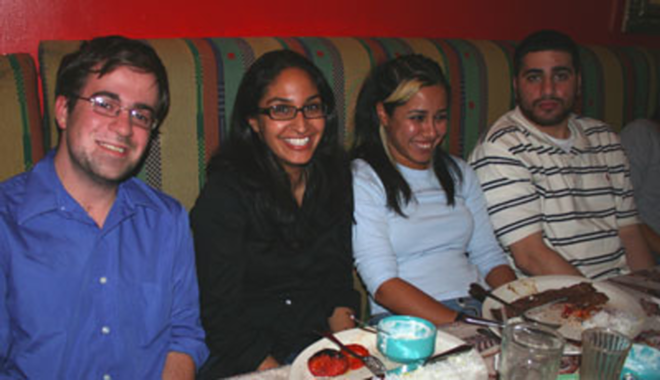
It was happenstance. The Jew sat next to the Palestinian. The Iranian beside the Iraqi. CPO 5934, officially listed as a graduate seminar in the "Politics of Modern Iran" on Monday afternoons in the SOC building. room 366. Dr. Mohsen Milani, professor.
The four students found themselves in the same classroom at the University of South Florida each week this semester, a microcosm of two of the Middle East's most intractable conflicts.
The Jews and Palestinians have been fighting over the same small plot of land for centuries. Iran and Iraq fought a bloody, chemical-weapons war for nine years after the Islamic Revolution swept Ayatollah Ruhollah Khomeini into theocratic power.
I signed up for the same class, part of my effort to get a master's degree in political science. Intrigued by my classmates' seating choices, I also noticed that during at least one week of classes, all four were fasting as part of their religious traditions, each in a slightly different way. Rafraf Barrak, an Arab Muslim from Baghdad, wore the hejab — a light scarf on her head — during Ramadan. Saeed Uri, a Palestinian Sunni Arab, fasted right alongside Trev Riley, an observant Jew who didn't eat during the day during the High Holy Days preceding Yom Kippur. Raheleh Dayerizadeh, a Persian Shiite Muslim whose roots are in southern Iran, didn't wear the hejab but did fast.
Barrak's backstory is the most dramatic of the four. She left Baghdad in 2004, a target of insurgents who wanted to kill her for working as a translator for an NBC reporting crew that included correspondents Don Teague and Kerry Sanders. One day, Barrak got in a cab to go to work and the driver took off in a different direction, locking the doors to keep her inside. She managed, after a struggle with the driver, to jump out when the cab slowed. Later, a neighbor who was kidnapped told her family that Barrak's name was on the kidnappers' list.
Barrak survived two near-miss car bombings as well. After her NBC employers left Baghdad, they raised money to bring her to the United States.
Riley has a Catholic father and Jewish mother and practices Judaism. He has been involved with Zionist groups such as USD Hagshama, which sponsored the first of his four trips to Israel, but now distances himself from them while still supporting Israel's right to exist peacefully. He has toured the country from Golan to Jerusalem to Tel Aviv, Haifa and the West Bank. He and his girlfriend, whose parents are Israeli immigrants, are considering aliyah (emigrating to Israel) upon his graduation.
Dayerizadeh's parents are from southwest Iran, Khorramshahr, which ended up being at the center of the Iran-Iraq War in 1980. Her parents fled the south to Tehran, where they met and married, her father Persian, her mother Iranian/Arab. Dayerizadeh was born in Houston after her parents left Iran to move to America. She has traveled to Iran five times to visit her family members who remained and speaks fluent Farsi.
Uri is a Palestinian who was born in Florida but whose parents moved back to Palestine with him when he was 7 years old, during the peaceful days of the Oslo accord. The family ran a Checkers hamburger restaurant and lived in the same neighborhood as PLO leader Yassir Arafat, but the second Palestinian Intifadah, or uprising, drove them from their native land again and back to the United States.
Seeing an opportunity for a firsthand crash course in the modern Middle East, I asked the four of them to sit down with me for a conversation just before our last class two weeks ago. I asked Uri to start by retelling a story he off-handedly mentioned a few weeks earlier:
Uri: I was talking to one of my friends and she goes to UT [University of Tampa]. We were sitting there and she was telling me how she just watched United 93. And I'm like, "Did you hear them speak Arabic during the movie?" And she asked me, "Why would they speak Arabic? I thought they were Iraqi?"
Dayerizadeh: (Laughs)
Uri: And I'm just sitting there thinking, "How many wrong things were in that comment right there?" It's just like so many stories.
Dayerizadeh: What did she think Iraqis spoke? [Most Iraqis speak Arabic as their primary language.]
Uri: I kind of got mad. I kind of called her stupid, and I was rude about it, because I was like, "Are you serious? There's people fighting in Iraq right now and all this talk going right now about how right the war is, and you don't know what Iraqis speak?"
Creative Loafing: And even though there were no Iraqis on any of the planes?
Uri: Last week, I was in the Subway [restaurant], and I was listening to these four or five girls talk about some Iranian girl. And they were sitting there arguing if Iranians are the same things as Arabians, and which one of them are related to bin Laden.
















